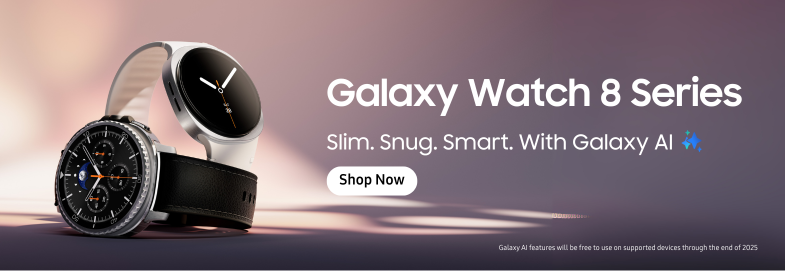Galaxy Watch Shows Strong Correlation With Clinical and Sports Science Equipment in University of Michigan Studies
Galaxy Watch’s fitness tracking features were comprehensively evaluated using elite runners to validate their level of accuracy
9/3/2024

Samsung Electronics Co., Ltd. together with the University of Michigan, today announced that the University of Michigan Human Performance & Sport Science Center (HPSSC) — renowned for its integrated and comprehensive sport, exercise, and human performance-related research and education — has validated the high accuracy of Samsung Galaxy Watch’s fitness tracking features.
HPSSC’s Michigan Performance Research Laboratory (MiPR) found a significant correlation between Galaxy Watch and the clinical and sport science reference devices’1 measurement of heart rate, sweat loss, VO2 max, and body fat percentage measurements, validating the reliability of Galaxy Watch’s monitoring capabilities. This partnership demonstrates how the collaboration between the two organizations makes advanced and precise fitness solutions accessible to more people.
The MiPR studies verified the accuracy of Galaxy Watch‘s fitness tracking features by monitoring key metrics from elite runners, including:
- Heart rate: As the most checked health metric during workouts, heart rate measures cardiovascular effort during physical activity or a workout. Findings show an excellent correlation — 90% — while running, the gold standard in heart rate measurement.
- Sweat loss: Sweat loss estimates the amount of fluid lost during physical activity and helps guide proper hydration after workouts. The study indicated a 95% correlation between Galaxy Watch and the reference device in assessing sweat loss during distance training — conducted on exercises ranging from 2.5 km to 20 km.
- VO2 max2: Understanding how much oxygen the body absorbs during workouts helps individuals assess their fitness levels and set optimal goals and limits. The study demonstrated an 82% correlation, indicating acceptable alignment between Galaxy Watch and clinical-grade diagnostic equipment measurements.
- Body fat percentage3: Measuring a person’s body fat percentage allows for a better understanding of physical health and fitness than tracking body weight. Galaxy Watch readings showed a 95% correlation with dual-energy X-ray absorptiometry (DEXA) results, the standard diagnostic test for body composition using low-dose x-rays.
“We’re proud to be recognized by the renowned Michigan Performance Research Laboratory — their skilled researchers and expertise in wearable technology give us confidence in the accuracy of the Galaxy Watch’s fitness tracking capabilities,” said Dr. Hon Pak, Senior Vice President and Head of Digital Health Team, Mobile eXperience Business at Samsung Electronics. “We are committed to delivering precise and insightful fitness tracking experiences through strategic partnerships and advanced research.”
“Our partnership with Samsung exemplifies the power of combining industry-leading expertise with pioneering independent research at the academic level,” said Co-PIs Adam Lepley, MiPR director and associate director of HPSSC research. “Together, we can advance scientific discovery and provide information back to consumers that will enhance the use of Samsung’s technology. This synergy underscores the power of uniting academic excellence with industrial innovation, and we are grateful for this collaboration.”





